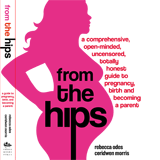Judith Warner's Call to Arms
Whew. Just read PERFECT MADNESS: MOTHERHOOD IN THE AGE OF ANXIETY by Judith Warner. Ate it up. And now, as a card-carrying member of the bulimic generation, I feel the need to purge. How convenient that Rebecca and I just started a newmom blog. Here goes.
Warner describes a history of American ideas about mothering that is straight-up riveting (I read the book in about two days -- and felt pretty good about tossing my nine-month-old baby the remote control as I read, since Warner is sall about taking the edge off perfect parenting). Here’s the breakdown: Motherhood was meant to be an all-encompassing, total immersion style gig for women in 19th century (Saintly “good”) and in the first half of 20th century (promoted by experts to be scientifically “good”). Then, soon after those Beaver days of Spock and Valium, women started to make real progress. By the 70s moms were chilling out, feeling good about work, about motherhood, no drama, gleefully imperfect. It would have been considered fairly insane, for example, if a 70s mom had devoted all her time to researching brain-power activities or if her kid showed up with some insanely crafty Halloween costume. No, in those days moms were proud of their laid-back mothering and felt guilt-free in the work place. However, the 80s turned this hopeful working mom reality into a kind of power mom "you can have it all" movement. And the increasing “winner-takes-it all” reality of our economy was starting to make a decent life very hard to achieve. Meanwhile, all of us young moms-to-be were still in college learning that we had “it all” in addition to a kind of watered down feminism (politics of victimization, deconstructing Madonna). We started to wonder why we felt so crappy even though we had won the "choice" to do with our bodies what we wanted to do. So, we all started micromanaging our angst with a whole array of eating disorders. We learned that “control” was everything. Which has lead to some serious “control freakishness” in our grown-up mom lives. Perfection! I can do it all! If I get organized…
PART TWO: How I Learned to Stop Worrying and Love Motherhood
According to Warner, we’re so busy wigging about whether we SUCK that we never stop to ask, why oh why isn't there any god damn support for us!? Is Warner blaming us (and our neurotic “dressing-on-the-side” narcissistic search for perfection) for dropping the ball on women’s rights? Not really. (You can tell she gets annoyed when yet another perky upper middle class friend of hers shows up for a dinner party with lactose intolerance, but…) In fact, in many wonderful ways this book is a call to arms. She points to how we have been systematically shafted. And paints a damn good picture of our lives and the big myth of all of our "choices."
Her point, in short, is that we DO NOT HAVE CHOICES. She argues rightly, for example, that women are basically meant to work (have sense of agency, and ability to provide) AND raise children. (She even uses one primate study to help with this claim.) She argues that we need to stop blaming ourselves and start demanding things like more support for daycare, less slanted studies about how important maternal bonding is, a better work reality (ie: not a 90 hour work week, etc). We need to banish this “Mommy War” idea. It is a lose-lose situation: We either live a somewhat mind-numbing Baby Einstein sing-a-long life all day, or we grind our asses in the workplace and feel like crap for missing our baby's first steps (not to mention wonder if our career is really *that* important when our whole salary is going to the nanny or daycare).
Despite all this drama and horror, this book made me feel great. It made me feel secure in my decision to send my infant to daycare and confident to back off from that feeling that mommy is "the only one" who can do this or that (the control freakishness). It made me feel like my desire to work was not in competition with my desire to nurture my baby. My feelings about the standards of public education and healthcare remained unshaken: As Warner explains, these are our real enemies.
What sucks about the book, however, is that for all her on-the-money descriptions (sometimes I felt like she had been spying on me for about 25 years), she keeps quoting women who say they want to be "PERFECT” moms. Who are these women? To give us credit, us bulimic daughters of the Reagan era are also the slacker, “grunge” generation of women who spent a fair amount of time rejecting notions of perfection (even as we spent good money "perfecting" our Courtney-Love-circa-Malibu hair-cuts in the late “boom" nineties). Maybe we do have a weakness for turning on ourselves when it gets rough (it's all *MY* fault things are not working out) but we are also a demanding new generation of moms, and I have some faith that we can start to turn the dial back to a more accommodating 70s-style momming (pass the Indian skirt and Molson Golden). Reading this book can help us see the light.
I just wish Warner could have peppered those quotes from high-achieving, super-perked NW Washington, DC moms with a few down-home quotes from some of the sisters I know who, when asked "How do you do it all?" say, with a smile, "That's easy, I suck at my job and I'm a lousy mom!"
in baby | parenting













